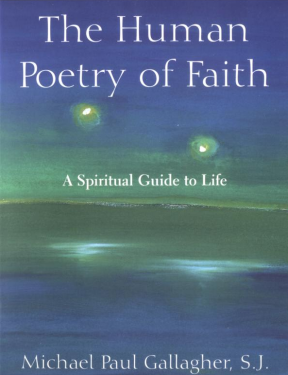This is the second column in a series
 EARLY ON IN HIS “The Human Poetry of Faith: A Spiritual Guide to Life” (New York: Paulist, pp. 142, $12.95), Father Michael Paul Gallagher, S.J., points out that his book is about liberating our human depths so that we might be open to God’s wonderful revelation. He writes the following:
EARLY ON IN HIS “The Human Poetry of Faith: A Spiritual Guide to Life” (New York: Paulist, pp. 142, $12.95), Father Michael Paul Gallagher, S.J., points out that his book is about liberating our human depths so that we might be open to God’s wonderful revelation. He writes the following:
“God’s Spirit is at work in all that is good. Like an artist, the Spirit shapes our entry into freedom on many levels. Therefore these pages explore the ‘pre-religious’ zone, where the Spirit works on us to lead us towards the fuller surprise of Christ…
“Is this book shy of explicitly Christian faith? No and yes. No – because its hope is to move towards the reality of Christ through the drama of the Spirit in our lives. Yes – because it is afraid to start with familiar Christian words and images, which seem tired and unalive for so many people. This book would like to see itself as echoing the ministry of John the Baptist – in the sense of preparing the imagination of today for a fresh recognition of the Lord.” (pp. 3, 4)
The above quotation speaks to me in several ways. One way is that I have become more and more aware that the Holy Spirit is involved in our lives every minute. The Spirit does not take time off! The Holy Spirit never leaves us. We are never abandoned by the Spirit. That means that at any moment something important can happen between us and God. Through his book, Father Gallagher is trying to make us more aware of some experiences which might make us more aware of God’s presence and more receptive to the Good News of Christ.
I understand Father Gallagher’s hesitation about starting with familiar Christian words and images. The sad fact is that these words and images are “tired” and “unalive” for many people. The lives of many are so secular that the words we use to express God’s presence just no longer speak to their experience or worse, don’t seem to be of any interest to them. This explains to me recent phenomena, such as some Catholics not wanting to be married in a church or not wanting the word “God” mentioned in their wedding ceremonies.
New Avenues Toward Depth
In his book, Father Gallagher wants to help readers discover new avenues toward depth in their own lives. He writes the following:
“The problem is that many people have encountered the Christian vision only in tired language and in frozen forms. The hope is to awaken the sleeping beauty of our wonder so that we can be more ready for the greater wonder that is Jesus Christ.” (p. 5)
I very much like that Father Gallagher uses literature to help us reach deeper and I think that some of the insights he has into the nature and power of literature are important. He points out that great literature can do something to us. It can create and even demand a receptive approach to mystery and to the depth of ourselves.
He insists that real reading involves allowing ourselves to be changed by the very experience of reading, not just by the content. He believes that an encounter with literature, similar to an encounter with faith, requires a kind of contemplative conversion in us. This insight seems really important. Could it be that the decline of reading literature that leads us into important mysteries is related to the difficulty that many have with the language of religious faith? Father Gallagher writes the following:
“Artists have always been hesitant about abstractions. Their calling is to the concrete drama of life and they specialise in speaking to our intuitive levels of consciousness: they hit us below the belt of reason. They awaken wonder and develop it into wisdom. They confront pain by going further into depth. The whole area that art evokes is the area that religion most needs and often fails to reach. In that spirit I draw on some major imaginative writers, taking some classic moments in literature as dramatizing crucial thresholds that we face.” (p. 6)
Besides literature, I am wondering if other art forms might also “hit us below the belt of reason.”
When she was being interviewed by Bill Moyers, Sister Wendy Beckett emphasized that to appreciate great paintings we had to be still, and she hoped that would help us to be still at other times in our lives. I think that she was saying that great paintings can call us into the realm of mystery. Does great music also do this? How about great films?
I suspect all great art has the power to open us to the depth of ourselves, others and perhaps God and so prepare us to be surprised by Christ.
Father Robert Lauder, philosophy professor at St. John’s University, Jamaica, is the author of “Pope Francis’ Spirituality and Our Story” (Resurrection Press).
